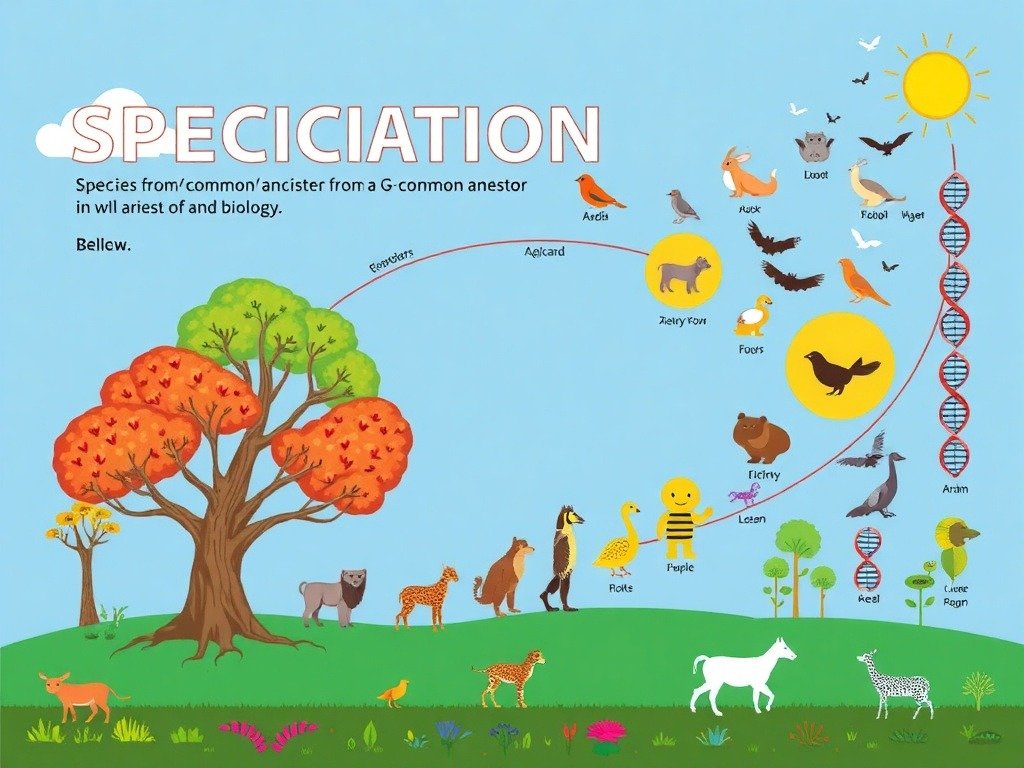The author is a researcher and content creator interested in discussing the interdisciplinary ideas that are related to the fields of science, culture, and philosophy. Having an experience in academic analysis and creative communication, the writer seeks to simplify intricate concepts to become available to the reader in an interesting and stimulating manner. The author attempts to awaken interest, stimulate the process of critical thinking, and demonstrate how abstract theories can be related to real life with the help of long-form articles.
Introduction
The term speciering is one of the concepts that evokes curiosity because it has definitions that are bifurcated to the extent that it raises curiosity in various aspects both in science, philosophy to the point of owning a cultural and linguistic context. Even the term itself is rooted in the Latin term species which has close historical association with terms of form, kind and classification. Speciering used in current discourse Speciering may refer to a process of foreseeing, dividing or the act of distinguishing or categorizing separate things.
The concept can be perceived as a scientific and intellectual practice and, moreover, it can be regarded as the metaphorical structure that determines the differences in the way the understanding of human humanities is formed, where people interact, and how they perceive things. Within science, speciering can be related somewhat to the science of biology, namely evolutionary biology, since the differentiation of species and their classification can play an imperative role in explaining the biological breadth of life. The term has however been adapted to wider realms as well.
In linguistics, as an example, it may refer to the definition of meaning and the very matter of drawing the lines between the words and their usages. It can be applied in philosophy as how human beings conceptualize categories by conceptualizing the separation between one concept and another one to form systems of thought. Speciering in the context of culture and society is mirrored in the fashion in which categories of people, neighborhoods and identities are established, which may determine social interaction and kinship.
The aim of this paper is to give a detailed discussion of speciering with regards to its varying definition and consequences occurring in various fields of life. We will start with its origins in natural sciences and address its symbolical and metaphorical application, culture and socially oriented interpretations, and end with some thoughts concerning its place in the contemporary world. In its conclusion, the reader will grasp more about how abstract an idea such as speciering can be and still be relevant in so many aspects of human knowledge.
Speciering in Biology
Speciering In the biological sciences, speciering is quite related to the term speciationShe is a process by which new species arise. Mechanisms underlying diversity in the natural world have long been of interest to evolutionary biology, and speciering provides one way to learn about what happens. When genetic divergence occurs within the populations of a certain species which most likely occurs due to geographic segregation, environmental constraints, and reproductive isolation, they may end up developing into different species.
This is the process that Darwin himself explained in the well-known theory of natural selection and it explains the biological significance of speciering. The very process of species (species) identification is a specieling activity. Taxonomists spend all their time sorting and categorizing living things into logical tiers. It is not just a naming, identifying but the perceiving of the interconnections of the organisms, their evolutionary backgrounds and the ecological niche of the species and groups. The idea of speciering, in this case, signifies the creation of new life forms as well as the human activity to explain them in terms of classification.
Speciering of Linguistics
Another area where speciering has a massive relevance is the language. Each word of a language has a particular meaning, however, the meaning of several words is interchangeable, alternating, and designing. Linguistics focuses on the ways people participate in the activity of speciering by means of the semantic distinction. This entails the use of defined boundaries between words, phrases or concepts used to avoid vaguties as well as to make the communication sharp.
To illustrate, the contrasting of the terms freedom and liberty might appear negligible; nevertheless, societies have been involved in speciering to create more specific definitions of freedom and liberty. On the same note, in the translation studies, speciering is necessary and becomes a practice as translators determine how to cross-reference one word in any target language to another unique to the source language and not lose its cultural or contextual meaning. This process demonstrates the fact that speciering is not simply in the domain of science but also in culture and communication as well as interaction among people.
Speciering in Philosophy
Philosophy is highly preoccupied with the nature of differences. Speciering, in this connection, is an intellectual act of classifying the thoughts and segmenting concepts to form rational structures. Since the days of Aristotle onwards, philosophers are concentrated on the significance of classification when comprehending reality. One of the oldest philosophical speciering exercises is the system of Aristotle of classifying beings by genera and species.
Such understanding was developed further by later thinkers who would examine the ways humans conceptualize categories and the ways in which mental constructs condition the manner in which we come to understand the world.
In ontology (metaphysics), e.g., speciering can assist us to distinguish between being and non-being, BS or tsS or awareness and reality, Being and Non-Being, Necessity and Contingency Speciering or speciering is a concept used in ethics to help philosophers to draw boundaries between right and wrong, justice, and injustice or duty and desire. This practice of drawing such distinctions is not incidental to the rational discourse but at the very core of its possibility.
Society and Culture speciering
Speciering is also a serious factor of social and cultural life. Societies will always involve themselves in making divisions of categorization be it cultural identities, ethnic groupings or even social roles. Such speciering may be empowering as well as problematic. Conversely, stubborn or exclusive types of speciering may result in stereotyping, bias as well as segregation.
Think of how contemporary cultures approach speciering as to gender identities, occupation, even generational monikers like Millennials, or Gen Z. Such differences can assist in interpreting cultural patterns and population tendencies, but they can lead to oversimplification, as well. Speciering extends in the political, economic and cultural classification of nations on how individual countries dichotomise nationally in international relations and discussions.
Speciering as a Cognitive Process
In addition to academic disciplines, it is also possible to see speciering as a basic way of thinking of human beings. Since we are small, human beings are trained to distinguish between things, concepts, and experiences. Through this process we are able to make the world meaningful, come up with patterns and even construct strategies to survive and interact. Psychologists claim that one of the simplest mental processes is categorization and speciering can be regarded as its advanced permutation.
As an example, when acquiring a language children are speciering, separating between nouns and verbs, adjectives or identifying difference between objects such as dog and cat. Adulthood widens this mental ability to abstraction so that we can distinguish between concepts such democracy and dictatorship or optimism and pessimism. This goes to show that this phenomenon of speciering is very much related to human construction of meaning in day-to-day life.
Speciering in Data Science and Technology
Speciering has assumed new meanings in the age of the digital. As big data, machine learning and artificial intelligence have exploded, categorization and classification have been front and center to technological innovation. Algorithms are in the process of being trained to perform the act of speciering all the time, whether it is recognizing faces, identifying spam emails, or placing items in categories so that online shoppers can navigate the site easier.
Clustering and classification are a type of model commonly used by data scientists and is simply a mathematical version of speciering. Machines can process tasks that resemble human thinking by training the systems to differentiate between categories. However, here the speciering is based on technology, which also has ethical implications, especially in regards to algorithm bias. As soon as the data with which AI is trained are outdated or are biased, the technology amplifies the same social issues, and that is why the issue of computational speciering influences society.
Symbolic Power of Speciering
There is of course a metaphorical way of looking at speciering as human attempts to bring order out of chaos. The world is riddled with interplay, entanglement and doubt and speciering is the reflection of how we in the world find a way to simplify such complexity. It indicates at once the strength and weakness of human knowledge–strength, because it allows us to make sense of the world in an intelligible way, weakness because our categories never exactly match reality.
Cultural critics, writers and artists have frequently made such symbolic use of it. An example of literature that has been used to critique this kind of speciering is that which demonstrates the resistance of human experience to categorizing in tidy packages. The same can be said of art, which tends to dissolve boundaries between categories by questioning the idea that everything should be specified or be put into categories. This demonstrates that species is both a science and a societal practice and a subject of creativity.
Conclusion
Speciering as a concept but as a term that is easily omitted is a formidable concept that is interlaced in almost all the aspects of human thinking and life. It is the invisible instrument that enables scientists to distinguish the species, reformers of language to distinguish the meaning, philosophers to organize concepts and society to sketch identities. It is a universal law of classification and differentiation that acts as a reminder to the fact that in order to know anything or everything we have to learn to see not only what is separating things out, but also what is binding things together.
Speciering is, in a constantly changing world where the border between globalization and technologies is gradually disappearing, gaining significance. It allows us to keep straight, protect differentiation and be meaningfully held together within the face of overpowering complexity. Meanwhile, it also is a call towards avoiding conventionality, it is a call towards nuance and towards embracing fluidity in reality. Wisdom, real wisdom, is in harmonizing the accuracy of speciering with the free play of the human imagination so far as our divisions may be made only to serve to unite, and not separate.
After all, speciering is not only an intellectual endeavor but also a way humans are driven to order in chaos, meaning in ambiguity and identity in diversity. It is a map and a mirror: a map of our explorations in knowledge and mirror of how we as individuals and civilisations thus define the world about us. With a clear vision of what theorizing is all about, we see further the richness of the human mind and that there is no limit to what results we could find.
Frequently Asked Questions (FAQ)
What is speciering?
Speciering is the act of classifying, differentiating or specifying, which can be employed in science, philosophy, linguistic and cultural terms.
Is speciation and speciering different?
Speciering is similar to speciation in the field of biology, the process through which new species form. Yet, speciering can be extended even beyond the field of biology.
So what is the significance of speciering in society?
Speciering assists societies in making an organizational system by defining identities, roles, and groups. But this should be used with caution not to be re-enforcing stereotypes or demarcation.
What is technology with respect to speciering?
Speciering in technology and data science Since the pioneering work by Thomas Malthus in the late eighteenth century, certain limitation of human reproduction has been a presumption in technology and data science in the form of classification algorithms, by which machines make judgments about classification, pattern recognition and prediction.
Is speciering bad?
Yes, speciering may result in oversimplification, stereotyping, and/or exclusions when used mercilessly or unequally. Speciering should not cause harm, and this has to be used responsibly and flexibly.

